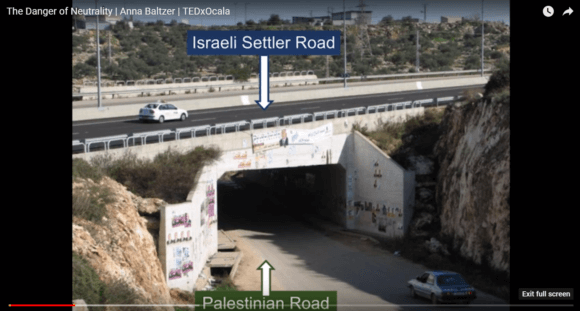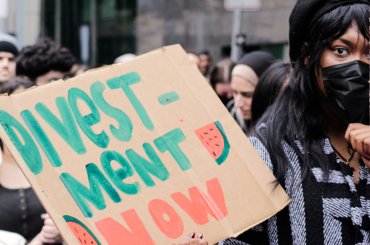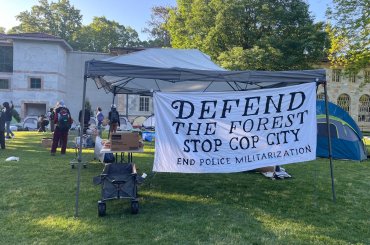Anna Baltzer of the U.S. Campaign for Palestinian Rights is one of the most effective communicators on our side of the issue (she was on the Daily Show with Mustafa Barghouti, a highlight in mainstream exposure for the Palestinian cause); and a couple months back, she gave a talk at TEDx in Ocala, Florida, about how she became an activist. She described abandoning the ideal she had grown up with, that she should be neutral in a conflict, when she went to Palestine and saw Palestinian conditions first hand.
What is most compelling is that it didn’t take Baltzer long to commit to the fight for human rights. No, it only took, bearing witness:
I found a system of segregated roads, with nice roads for Jewish Israeli settlers and separate roads for Palestinians.
And all around me I saw inspiring Palestinian popular resistance and its violent suppression by Israel, a military superpower armed by my own country, the United States.
What more does anyone need to know? Baltzer had been a Zionist as a young woman, but she now turned against that ideology.
And I knew that Israel would pay me to move on to that Palestinian land, simply because I’m Jewish.
I did not know at the time that Israel’s Jewish majority could only exist through the removal of Palestinians.
When she broke through her own resistance, she was at first afraid, but it resulted in an enlargement of her own spirit:
When I finally gave myself permission to take a side and reject Zionism, I found a liberation I could never have expected: a liberation from my fear of the other; a liberation from the contradictions and the paralysis. I had worried I would lose so much, but instead I had found exactly what I was looking for. I was not rejecting who I was; I was finding who I was.
In pursuing that ancient goal, self-discovery, Baltzer has learned about the nature of struggle on behalf of others:
Taking a side means being accountable to those who are being oppressed, not deciding what they need and how they should get it. It means heeding their calls to action, which may look like starting conversations with your family and friends, or engaging in campaigns like boycotts and divestment, or stepping out of your comfort zone and taking to the streets.
She challenged the Ocala audience in a way that resonates for all Americans — citing the civil rights struggle:
Let me ask you something. How many of you, like me, celebrate the Civil Rights Movement and imagine that you would have been the one holding Martin Luther King, Jr.’s hand, marching from Selma to Montgomery; that your home would have been a stop on the underground railroad for runaway slaves, regardless of the personal risks? The thing is, it’s easy to stand against slavery and 1960s Jim Crow laws today. But we forget how controversial they were in their own time. We forget that the successes of the Civil Rights Movement did not come from legitimizing both sides; that slavery did not end from bringing both sides together. Change happened because people took sides, and took risks.
Anyone can celebrate Dr. King today, but there is one question to gauge the likelihood that you would indeed have been there with him. Where do you stand on the freedom struggles of our time? Do you stand boldly with the freedom fighters?
Baltzer brings Palestinian activism to the contemporary American stage, by going on to Ferguson, mass incarceration, and her own “internalized white supremacy.”
And she concludes by daring her audience to be activists too. “It only takes a small but critical mass to change the course of history.”
I’ve said before, we live in a radical age. A little bit of that radicalism, turned on the Israel/Palestine conflict, inside the U.S., would transform the politics of the conflict, and put real pressure on Israel. Baltzer is of course a supporter of Boycott, Divestment and Sanctions, or BDS– on these grounds, which the “conflict” has proven to be a rule, decade after decade:
It became clear that neutrality wasn’t a catalyst for mediation or change; it was the exact opposite. It was a trap — a dead end. It maintained the power imbalance exactly as it was, leaving the scales tipped in favor of those with power.



really excellent speech by Anna Baltzer
RE: “I found a system of segregated roads, with nice roads for Jewish Israeli settlers and separate roads for Palestinians.” ~ Anna Baltzer
SEE: “US Funds Apartheid Roads on West Bank” ~ by Mel Frykberg, Inter Press Service, 5/24/10
CONTINUED AT – http://www.ipsnews.net/2010/05/mideast-us-funds-apartheid-roads-on-west-bank/
* SEE: “US funds ‘apartheid’ road network in Israel” | By Jonathan Cook | TheNational.ae | May 15, 2010
LINK – http://www.thenational.ae/news/world/middle-east/us-funds-apartheid-road-network-in-israel
P.S. ALSO SEE: “Palestinian Roads: Cementing Statehood, or Israeli Annexation?”
By Nadia Hijab and Jesse Rosenfeld | The Nation | April 30, 2010
New evidence indicates that the PA’s ambitious road-building program–heavily funded by the United States and Europe–is being used by Israel to facilitate settlement expansion.
LINK – https://www.thenation.com/article/palestinian-roads-cementing-statehood-or-israeli-annexation/
I agree with Anna Baltzer in regard to rejecting “neutrality”.
The moral position is to take a side, not sit on the fence, and for me that means taking the side of peace and social justice and democracy.
This was a powerful TED talk, thank you for bringing it to our attention!
This is probably somewhat off-topic but the annual World Happiness Report is out. Israel is holding steady at 11th place. The U.S has dropped from 14th to 18th.
http://worldhappiness.report/